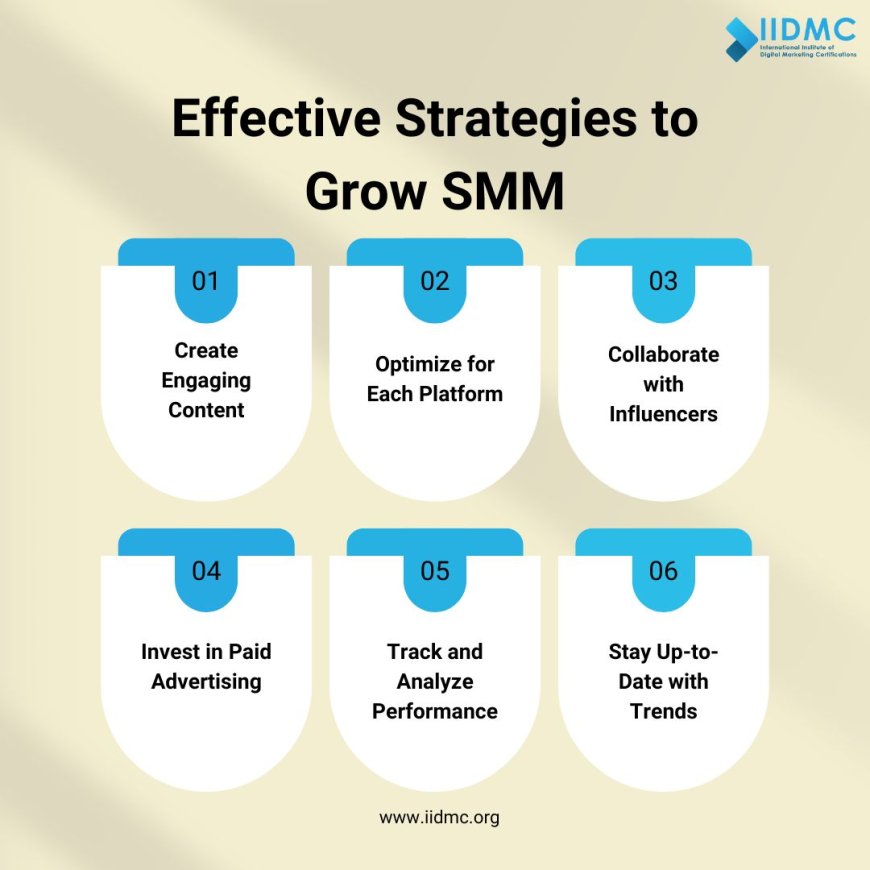Effective Strategies to Grow SMM
Learn easy ways to boost your social media marketing. Discover effective strategies for growing your online presence and engaging your audience.

Social Media Marketing (SMM) is an essential tool for businesses looking to expand their online presence and connect with a broader audience. Using various social media platforms, businesses can engage with potential customers, build brand loyalty, and increase sales. A successful SMM strategy involves creating engaging content tailored to each platform, actively interacting with the audience, using data analytics to refine tactics, investing in paid advertising for wider reach, nurturing online communities, and collaborating with influencers to boost brand visibility. In today's digital marketing, SMM is not just about having a social media presence but about actively engaging and forming meaningful connections with your target audience to effectively grow SMM.
Social Media Marketing stands as an indispensable tool for modern businesses, transcending from a mere option to a necessity in the digital environment. Its significance lies in its ability to connect brands directly with their target audience, fostering engagement, brand awareness, and loyalty. Through strategic utilization of platforms like Facebook, Instagram, Twitter, and LinkedIn, businesses can leverage SMM to amplify their reach, cultivate a robust online presence, and drive traffic to their websites.
Increasing Importance of SMM
Social media marketing (SMM) has undeniably become a cornerstone of modern marketing strategies, and its significance continues to grow exponentially. Here's why
Expansive Reach: Social media platforms boast billions of active users worldwide, offering an unparalleled opportunity for businesses to connect with a vast audience. Whether it's Facebook, Instagram, Twitter, LinkedIn, or emerging platforms like TikTok, each provides a unique avenue for engaging with potential customers.
Targeted Advertising: SMM platforms provide advanced targeting options, allowing businesses to tailor their content and digital ads to specific demographics, interests, behaviours, and even locations. This precision targeting maximises the efficiency of marketing efforts, ensuring that messages reach the most relevant audience segments.
Cost-Effectiveness: Compared to traditional advertising channels like TV or print media, SMM often offers a higher return on investment (ROI). Many social media platforms provide affordable advertising options, making them accessible even to businesses with limited budgets. Additionally, the ability to track and analyze campaign performance in real time enables marketers to optimize spending and achieve better results.
Brand Visibility and Recognition: Active participation in social media activities helps businesses increase brand visibility and brand recognition. Consistent engagement with followers fosters trust and loyalty, ultimately leading to increased brand advocacy and word-of-mouth referrals.
Customer Engagement and Feedback: Social media facilitates direct communication between businesses and their audience. Through comments, messages, and reviews, customers can provide valuable feedback, ask questions, and share their experiences. By actively engaging with customers on social media, businesses can cultivate stronger relationships, address concerns promptly, and demonstrate their commitment to customer satisfaction.
Content Distribution and Virality: Compelling content has the potential to go viral on social media, reaching millions of users within a short period. Whether it's an entertaining video, an informative infographic, or a captivating image, shareable content can significantly amplify brand exposure and generate organic growth.
Influence of Peer Recommendations: Social media influencers wield significant influence over their followers' purchasing decisions. Collaborating with influencers relevant to their industry allows businesses to leverage their credibility and reach a highly engaged audience, driving brand awareness and conversions.
Common pitfalls and mistakes in SMM
In social media marketing (SMM), there are several common pitfalls and mistakes that businesses often encounter. These can hinder their efforts to effectively engage with their audience and achieve their marketing goals.
-
Lack of Strategy: One of the most common mistakes is diving into social media without a clear strategy aimed at growing SMM. It's important to define your objectives, target audience, messaging, and platforms before you start posting.
-
Inconsistent Branding: Inconsistency in branding across different social media platforms can confuse your audience and weaken your brand identity, hindering efforts to grow SMM. Make sure your branding elements such as logos, colours, and tone of voice are consistent across all channels.
-
Ignoring Analytics: Failing to track and analyze your social media performance can prevent you from understanding what's working and what's not, impeding efforts to grow SMM. Regularly monitor analytics to gain insights into your audience's behaviour and adjust your strategy accordingly.
-
Over-Promotion: Constantly bombarding your audience with promotional content can turn them off and hinder efforts to grow SMM. It's important to strike a balance between promotional and non-promotional content, focusing on providing value to your audience.
-
Ignoring Customer Feedback: Social media provides a platform for customers to voice their opinions and concerns. Ignoring or dismissing customer feedback can damage your reputation and lead to a loss of trust, inhibiting efforts to grow SMM. Be responsive and address customer inquiries and complaints promptly.
-
Not Engaging with the Audience: Social media is all about building relationships and engaging with your audience. Simply broadcasting content without interacting with your followers can hinder efforts to grow SMM and foster meaningful connections.
What are the effective strategies to grow SMM?

Create Engaging Content: Develop a content strategy that includes a variety of formats such as videos, images, and infographics. Craft compelling captions and use relevant hashtags to increase discoverability. Encourage engagement by asking questions, running polls, and responding to comments promptly.
Optimize for Each Platform: Tailor your content and posting schedule to fit the preferences of each social media platform. Use analytics to identify peak posting times and adjust your strategy accordingly. Leverage platform-specific features such as Instagram Stories, Facebook Live, and LinkedIn Pulse to maximize engagement.
Collaborate with Influencers: Partner with influencers in your niche to expand your reach and credibility. Identify influencers whose audience aligns with your target demographic and collaborate on sponsored content or product endorsements. Influencers can help amplify your message and attract new followers to your social media profiles.
Invest in Paid Advertising: Allocate a portion of your marketing budget to paid campaigns on social media platforms. Experiment with different ad formats such as sponsored posts, carousel ads, and retargeting campaigns to reach a wider audience. Use targeting options to segment your audience based on demographics, interests, and behaviours for maximum effectiveness.
Monitor and Analyze Performance: Regularly track your social media analytics to measure the effectiveness of your campaigns. Monitor key metrics such as reach, engagement, click-through rates, and conversions to identify areas for improvement. Use insights from analytics to refine your strategy, optimize your content, and achieve better results over time.
Social Media Marketing (SMM) remains crucial for modern business strategies, offering opportunities for brand growth, engagement, and customer interaction. By leveraging the reach of various platforms, tailoring content to audiences, and forming partnerships with influencers, businesses can navigate the digital environment to foster connections and drive results. Success in SMM requires a thoughtful approach, monitoring performance metrics, and adapting strategies based on insights from analytics. By avoiding common pitfalls such as lack of strategy, inconsistent branding, and over-promotion, businesses can unlock the potential of SMM to cultivate an online presence and propel their growth in digital marketing.





























